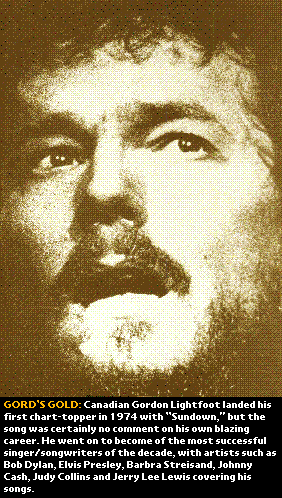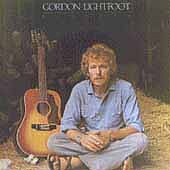|
"Sundown" Gordon Lightfoot Reprise 1194 Jun. 1974 Billboard: #1
Born on November 17, 1938, in Orillia, Ontario, Canada, on Lake Simcoe (80 miltes north of Toronto), Lightfoot showed musical expertise as early as age 11. The principal of his elementary school was impressed enough with his young pupil's vocal ability to ask him to sing over the public address system on Parents Day. He won various local talent contests, but ultimately he found Orillia too limiting. Continuing to pop up in various areas of the Toronto performing arts scene until 1963, Lightfoot settled into singing and playing his guitar. At the same time, he discovered the music of Bob Dylan. "He was moving into musical areas where angels feared to tread, so to speak. He was getting into areas that no one had ever explored before. Lyrically and musically, he had an extremely rural approach, which was partly in keeping with my influences," Lightfoot said in Billboard. The Tysons were managed by Albert Grossman, who also represented Dylan and Peter, Paul and Mary. Grossman told Lightfoot that the trio were interested in recording his song "Early Morning Rain," and soon Lightfoot was also being managed by Grossman. Signed to United Artists Records in the '60s, Lightfoot moved over to Reprise in 1970. He charted for the first time on the Billboard Hot 100 with "If You Could Read My Mind," a number five hit in February, 1971. His next three chart entries failed to make the top 50, but then along came "Sundown." The song was composed during one of Lightfoot's marathon writing sessions. In an April, 1975, Billboard interview, he disclosed, "I've been writing for deadlines for the last three years and 'Sundown' was one of a string of songs that I wrote when I lived on a farm out in King Township, just outside of Toronto... I was getting off a tune every day out there. It certainly turned out to be a royal flush." Asked to reveal the secret of the number one single's success, Gordon replied, "It's a down-the-middle rock 'n' roll song with interesting lyrics. Besides that it had a nice groove to it. Of course, I was really quite pleased at the way it shot right up there. Another tremendous surprise was the way it crossed over into the country market." Two years later, Lightfoot's "The Wreck of the Edmund Fitzgerald" (about an ore vessel that sank on Lake Superior), became a number two hit for the baritone singer. In 1985, he joined artists like Joni Mitchell, Neil Young and Bryan Adams to record "Tears Are Not Enough," the Canadian contribution to the fundraising campaign to feed the starving people of Africa, which was spearheaded by USA for Africa's "We Are the World." Lightfoot didn't release a new album for the next eight years, but toured regularly and still commanded a loyal following, particularly in his native Canada. In 2002, Lightfoot suffered an abdominal aortic aneurysm and spent six weeks in a coma, but eventually recovered after four surgeries. Doctors performed a tracheotomy on him during his hospital stay, causing vocal cord damage that greatly weakened his singing voice, but he was back onstage by 2004. In 2019, he was the subject of the documentary Gordon Lightfoot: If You Could Read My Mind, and around that time, celebrated his 80th birthday with an extensive tour. He died on May 1, 2023, at the age of 84. - Fred Bronson, The Billboard Book of Number One Hits, Billboard, 1988.
No comments so far, be the first to comment. |


